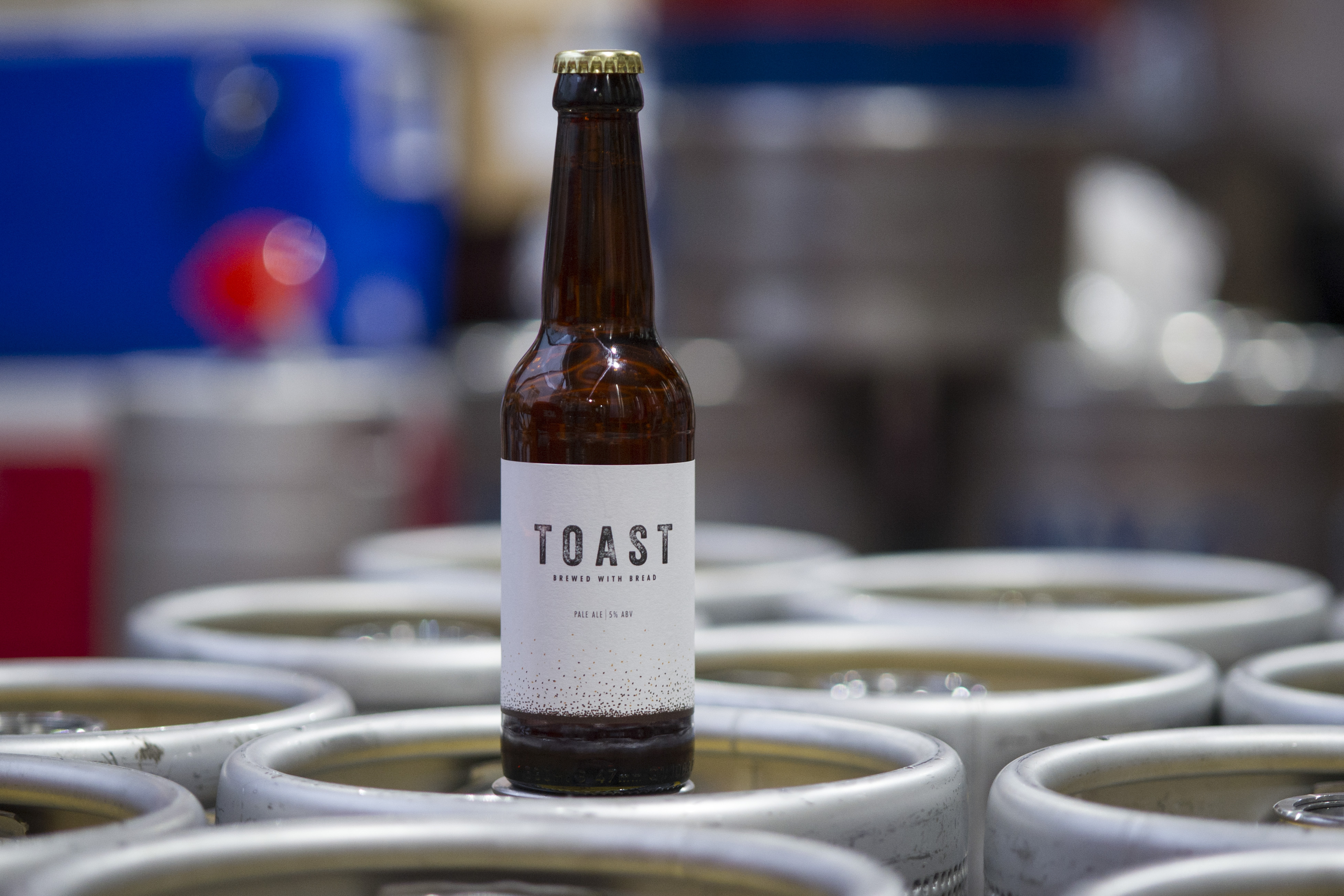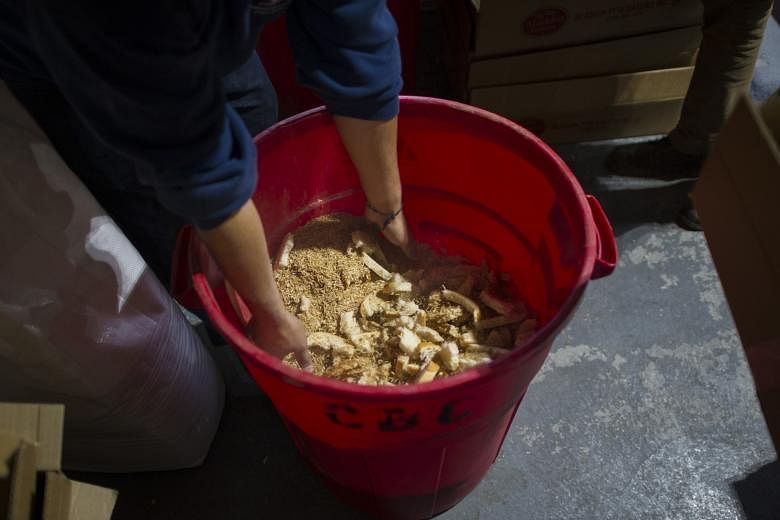(NYTIMES) - Overproduction is built right into the business model of most bakeries. While we devour much of what is made, huge quantities of perfectly good grain are tossed.
But Mr Tristram Stuart, an Englishman who began battling food waste 15 years ago, long before it became a popular cause, discovered a way to turn bread, an inexpensive product with a short shelf life, into one that is long-lived and lucrative: craft ale.
After coming across a recipe, he refined it with Hackney Brewery in London and then contracted with Hambleton Ales in North Yorkshire to produce it in quantities. In 2016, Mr Stuart began selling Toast, an English ale with malt and citrus notes, at London restaurants, online and through a growing number of distributors. Using roughly one slice per bottle, his team of three has recycled 3.6 tons of bread in its first 15 months.
Now, in his first satellite operation, Mr Stuart, 40, has begun making beer in New York. Working with Chelsea Craft Brewing Co., in the Claremont section of the Bronx, Toast produced the pilot batch of its American Pale Ale in March.

On Apr 22, the first bottles of the ale were sampled at the Tribeca Film Festival for the screening of Wasted! The Story Of Food Waste, a documentary produced by travel show host Anthony Bourdain in which Mr Stuart is featured.
Mr Stuart's New York team has set the date for the second brew, which will be much larger to accommodate an order from Whole Foods. This summer it should be available there, and at bars and restaurants in Brooklyn, Manhattan and Queens.
To finance its next two New York brews, Toast began a crowdfunding campaign. Mr Stuart also began franchising the Toast concept to entrepreneurs around the world who will brew the beer to aid his food-waste mission.
Toast has yet to turn a profit, but Mr Stuart says that when that happens, as he expects this year, all proceeds will go to Feedback, his nonprofit group, which plans to finance future anti-waste campaigns.
Though few commercial brewers make beer with bread instead of malted grain, home brewers have been doing it for millenniums. Mr Stuart was introduced to the idea while visiting Brussels Beer Project, a microbrewery in Belgium. Babylone, one of many beers the brewery produces, is based on an ancient Babylonian recipe that called for loaves of bread. Toast uses whatever can be easily donated - even bagels work - as long as it does not contain nuts or seeds.
It took months to find a contract brewer willing to put untested ingredients into its tanks. Ms Madi Holtzman, one of two women leading the American effort, said she spoke with every microbrewery in New York state. After dozens of emails and phone calls, Chelsea Craft Brewing, which moved to the Bronx two years ago from Manhattan, signed on to make the first batch on March 21.
Mr Mark Szmaida, the head brewer at Chelsea, was all shades of skeptical before the big day.
"My brewer friends said, 'You're crazy,'" he said. The problem was that bread has gluten, and gluten turns gummy. Szmaida worried that the bread would become an unforgiving mass, and the metal rakes inside his tanks would get stuck.

But the brewery's owner, Pat Greene, was game. "In 25 years, I've never had a beer I couldn't get through," he said, referring to the steps of the brewing process.
With the brewery locked in, Ms Holtzman turned her attention to the bread. She called Aladdin Bakers in Brooklyn, where Mr Ira Sugerman, the vice president for sales and marketing, said he had plenty to donate. "I don't know any bakery that has no waste," he said.
While the baking company sends its excess to churches, animal-feed producers and City Harvest, which feeds the poor, Mr Sugerman was happy to send Toast any leftovers that those organisations could not redistribute.
"What's the difference?" he said. "It's being reused and recycled. And I happen to like beer."

On the day of the first brew, the team showed up at 7.30am. Two hundred and fifty pounds of sliced sandwich bread was torn by hand into 3-inch pieces - any smaller and they might clump together. (Though the Toast brewers used to toast the bread, they have stopped in order to consume less energy.)
Then the brewers layered ingredients in what they called a lasagna approach. The bread was mixed with rice hulls to help prevent the bread from sticking, and alternated in the tank with malt. When the barley hit the mash, the air took on the warm, fragrant smell of a bakery. Later, several rounds of hops were added.
It is this final step that gives the American ale its more pronounced hop flavour and aroma, which are complemented by smooth caramel notes. In England, Toast has added a Craft Lager and a Session IPA.

Reusing food waste has become a much bigger cause than when Mr Stuart first campaigned in 2002. He wrote a book published in 2009, Waste: Uncovering The Global Food Scandal, and held an event to publicise it - Feeding The 5,000 - in London. Originally planned as a one-off, the event drew enough attention to continue; more than 30 have been held around the world, with the next one scheduled for May 4 in Los Angeles.
"The idea isn't just to solve food waste itself, but to use food waste as the most blatant illustration of the fact that the global food system is built on a fundamental paradox - that we need to double food production by 2050 to feed the 9 billion," Mr Stuart said.
The chef Dan Barber, another crusader against wasted food, put Toast ale on his menu at wastED London, a recent pop-up that served meals made entirely from salvaged ingredients, and he plans to add it to his menu at Blue Hill in Manhattan.
"It's a really creative solution to a pretty insurmountable problem," Barber said of the beer, which he paired with his cured waste-fed pig.
Eventually, Mr Stuart hopes to see nonprofit organisations and bakeries around the world paired up to create their own regional versions of the beer. "This idea generates revenue," Mr Stuart said. "It's cool and upbeat, and we can have a party to solve the problem."





